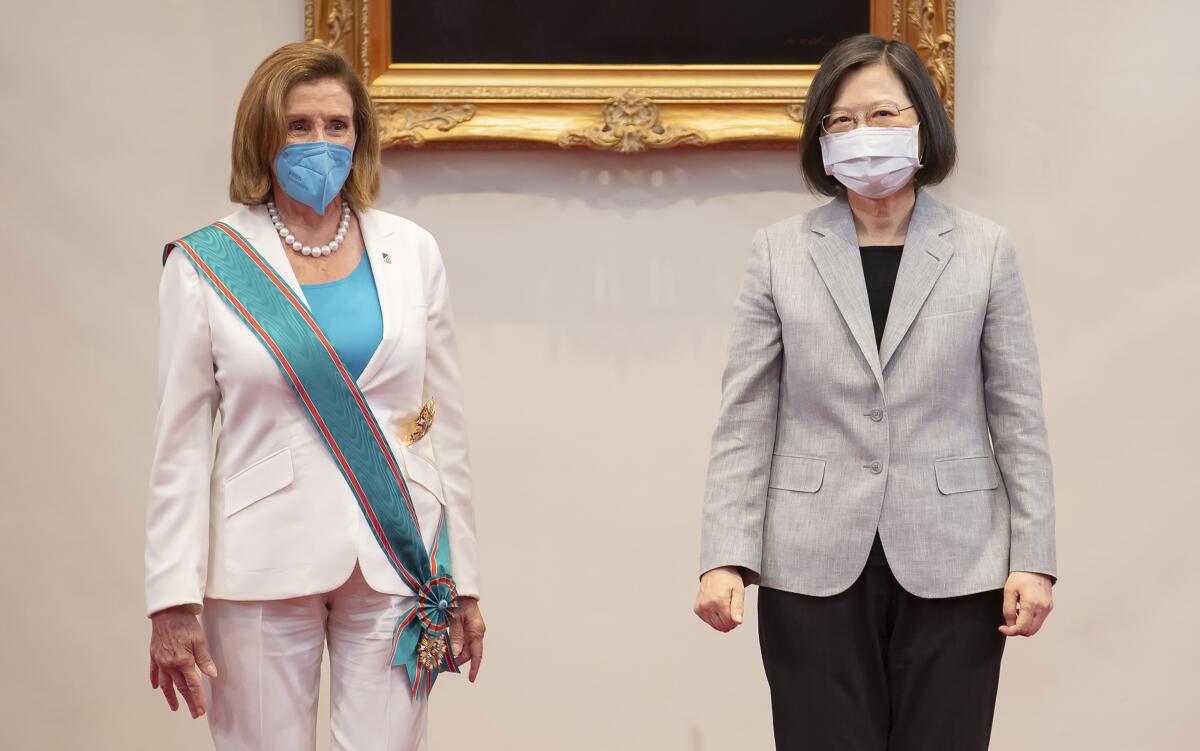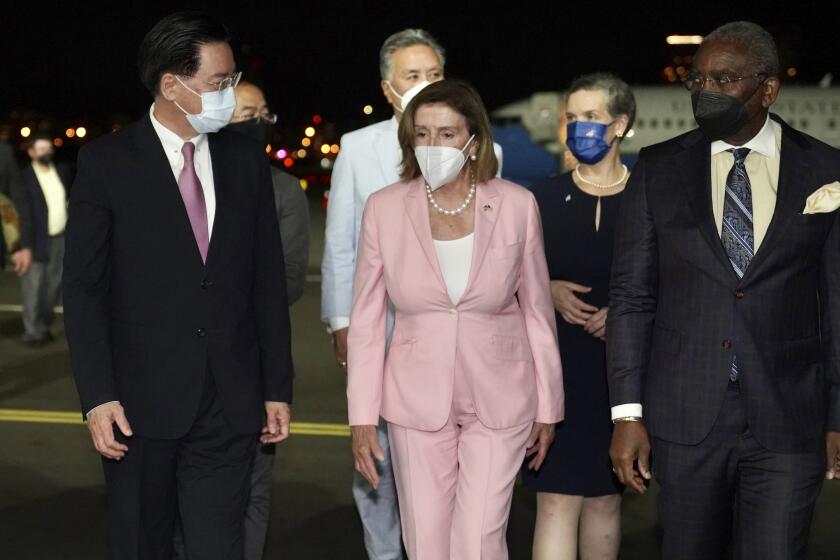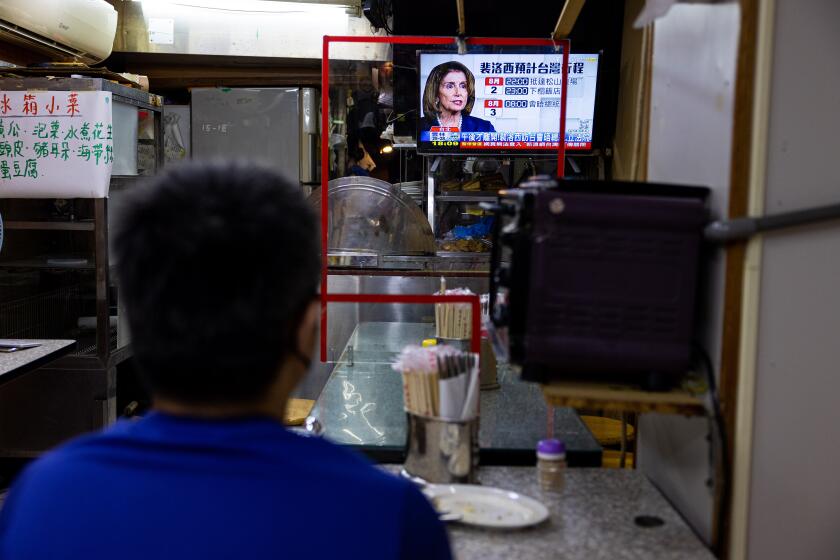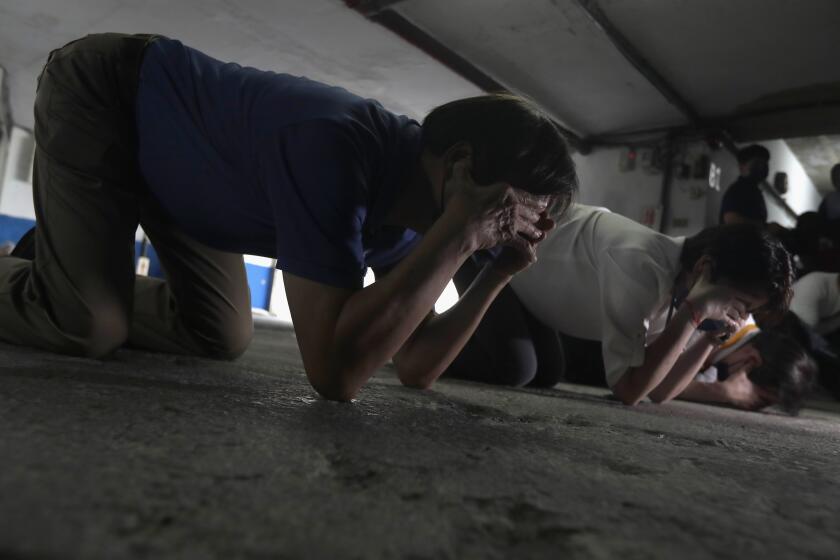News Analysis: As Pelosi leaves Taiwan, stability in Asia grows more precarious

- Share via
TAIPEI, Taiwan — The expressions of mutual support and admiration were broadcast on live TV and went off without a hitch.
House Speaker Nancy Pelosi reaffirmed her support for Taiwan, declaring Wednesday that American resolve to preserve democracy on the self-governed island remained “ironclad.” A grateful Taiwanese President Tsai Ing-wen then bestowed on the San Francisco Democrat the turquoise sash and medal of the Order of Propitious Clouds in honor of Pelosi’s contribution to U.S.-Taiwan relations.
But while those ties might have been strengthened during a visit lasting less than 24 hours, the biggest consequences of Pelosi’s trip are expected to unfold in the coming days, weeks and even months, analysts say, as China reacts furiously to what it deems an affront to its sovereignty over Taiwan. The result is likely to be increased instability in Asia — home to more than one-third of the world’s population — and greater challenges for the U.S.
Beijing began rolling out punitive measures even before Pelosi left for South Korea on Wednesday, adding hundreds of products, including fruit and fish, to a list of banned Taiwanese exports to China to step up economic pressure on the island of 23 million, which counts the mainland as its largest trading partner. Taiwanese government websites also experienced a spate of cyberattacks while Pelosi was in Taipei.
On Thursday, China is scheduled to launch an unprecedented four-day military exercise in waters surrounding Taiwan. The live-fire drills, which will include naval assets and missile tests, are expected to paralyze one of the world’s most important commercial waterways and normally busy air traffic.
While experts say China has no intention of starting a war for now, the risk of a miscalculation leading to an errant encounter with nearby U.S. or Taiwanese military units is uncomfortably high. On Wednesday, Taiwan’s Ministry of Defense said China’s plans were tantamount to a blockade, infringing on Taiwan’s sovereignty and international laws. In addition, U.S. allies such as Japan and South Korea are increasingly unnerved by China’s willingness to project its military strength.
For Pelosi, the Taiwan visit is a legacy-building trip that may serve as a capstone to her long record as a critic of China.
Bonnie Glaser, director of the Asia Program at the German Marshall Fund, a nonpartisan public policy think tank, said Pelosi’s visit has inflicted potentially irreparable damage to the already-tense ties between Washington and Beijing.
“We all know how bad this relationship has been in the past year,” Glaser told reporters Tuesday. “This visit by Nancy Pelosi is just going to take it to a new low. I think that it’s going to be very difficult to recover from that.”
Pelosi’s visit — which was aimed at strengthening democracy in Asia — has threatened to upend the delicate balance that governs U.S. and Chinese dealings with Taiwan. China claims the island as part of its territory, although Taiwan is ruled by a democratically elected government that considers itself politically and culturally separate from Beijing. The U.S. acknowledges China’s position but doesn’t endorse it, maintaining informal relations with Taiwan.
As the U.S. and China spar over everything from tariffs to technology, Taiwan is possibly the most inflammatory point of discord between the two countries, and the one experts consider most likely to lead to military conflict.
Op-Ed: Pelosi’s Taiwan visit didn’t cause heightened China-U.S. animosity. But it isn’t helping
Even if Pelosi had skipped Taipei on her tour of Asia, America’s gradually shifting policy on Taiwan has increased China’s tensions with the U.S.
Chinese leader Xi Jinping has staked part of his credibility on the idea of unifying with Taiwan, by force if necessary, and has little incentive to moderate his stance. His hard-line approach has helped put him on the verge of securing a historic third five-year term as president.
“He’s benefited so much from behaving this way. It only reinforces this behavior in the future,” said Alfred Wu, a professor of Chinese politics at the National University of Singapore. “There’s no reason to reverse course.”
Equally, Pelosi’s visit and China’s aggressive response to it has likely strengthened support for Taiwanese leader Tsai’s administration and driven more voters to her Democratic Progressive Party ahead of local elections in November. In a sign of how political support for China has dissipated, even the more China-friendly opposition Nationalist Party said it welcomed Pelosi’s visit Tuesday.
“The Tsai administration and DPP will tout Pelosi’s visit as a foreign policy success, that it was able to strengthen its relations with the U.S.,” said Brian Hioe, a founding editor of the Taiwan-based media outlet New Bloom.
Taiwanese people are used to threats of force by China, and urge the House Speaker to visit. But it’s a crisis not of their making.
Greater electoral success for Tsai’s coalition, known as the pan-green camp, will inflame Beijing further at a time when it’s already convinced that Washington is driving Taiwan toward independence with visits by high-level officials such as Pelosi.
The U.S. disagrees and says it still adheres to its long-standing “one-China” policy. U.S. officials have repeatedly said they support the status quo.
One major concern for China is that Pelosi’s stop in Taiwan will embolden high-ranking officials from other countries to visit as well, strengthening diplomatic support for an island that Beijing works hard to isolate.
The Guardian reported this week that Britain’s parliamentary foreign affairs committee is planning its own trip to Taiwan to show its support later this year. According to the British newspaper, China’s ambassador to the U.K. has opposed that possibility, warning of “severe consequences” and not to “dance to the tune of the United States.”
A stronger army is needed to deter a wider conflict that could entangle the U.S. at a time when calls are growing in Washington to defend the island.
“Speaker Pelosi opens up the door more widely for Taiwan,” said Fang-Yu Chen, assistant professor of political science at Soochow University in Taiwan. “I think there will be more high-level visits for Taiwan in the coming years.”
Another consequence of Beijing’s strong reaction to Pelosi’s visit could include a re-thinking of security policy for China’s neighbors.
The U.S. has already bolstered defense ties with countries such as Japan, South Korea and Australia in response to China’s growing power, but that could extend to other countries if the Taiwan situation becomes more volatile. On Wednesday, Australian Defense Minister Richard Marles announced a strategic review of his country’s military, driven by rising geopolitical risks and China’s own military buildup.
“Countries in Southeast Asia are also watching with great interest because if the Chinese are able to pull off a drill of this scale around Taiwan, they can imagine similar scenarios in the South China Sea,” said Collin Koh, a research fellow at Singapore’s Institute of Defense and Strategic Studies.
Breaking News
Get breaking news, investigations, analysis and more signature journalism from the Los Angeles Times in your inbox.
You may occasionally receive promotional content from the Los Angeles Times.
Given its proximity to Taiwan, Japan has tried to deepen security ties with the island, sending a delegation there last month that included former Defense Minister Shigeru Ishiba.
On Wednesday, Japan’s Chief Cabinet Secretary Hirokazu Matsuno expressed concern over China’s planned military drills, which could serve as a dress rehearsal for a blockade that extends to Japanese and South Korean waters.
Such fears failed to dispel the excitement of some Taiwanese over Pelosi’s brief presence among them. One bakery in Taiwan’s Changhua county garnered attention for adding a free egg-yolk pastry to box orders for every hour Pelosi remained on the island.
As Pelosi prepared to depart, she shook hands and posed for photos with Taiwanese officials, U.S. representatives and airport workers on the tarmac before her 6 p.m. flight to South Korea. With a few final waves, she and the rest of her delegation disappeared into the aircraft, leaving Taiwan in potentially graver peril than when she arrived.
Pierson reported from Singapore and Yang from Taipei.
More to Read
Sign up for Essential California
The most important California stories and recommendations in your inbox every morning.
You may occasionally receive promotional content from the Los Angeles Times.


















